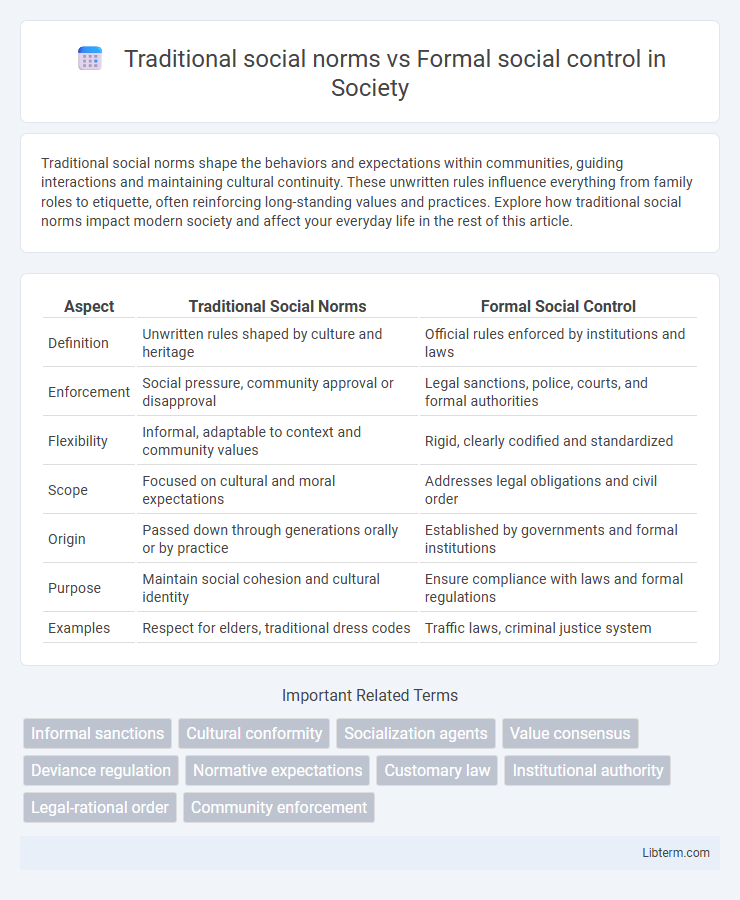Traditional social norms shape the behaviors and expectations within communities, guiding interactions and maintaining cultural continuity. These unwritten rules influence everything from family roles to etiquette, often reinforcing long-standing values and practices. Explore how traditional social norms impact modern society and affect your everyday life in the rest of this article.
Table of Comparison
| Aspect | Traditional Social Norms | Formal Social Control |
|---|---|---|
| Definition | Unwritten rules shaped by culture and heritage | Official rules enforced by institutions and laws |
| Enforcement | Social pressure, community approval or disapproval | Legal sanctions, police, courts, and formal authorities |
| Flexibility | Informal, adaptable to context and community values | Rigid, clearly codified and standardized |
| Scope | Focused on cultural and moral expectations | Addresses legal obligations and civil order |
| Origin | Passed down through generations orally or by practice | Established by governments and formal institutions |
| Purpose | Maintain social cohesion and cultural identity | Ensure compliance with laws and formal regulations |
| Examples | Respect for elders, traditional dress codes | Traffic laws, criminal justice system |
Introduction to Social Norms and Social Control
Traditional social norms are informal rules and shared expectations that guide behavior within communities, often passed down through generations to maintain social order. Formal social control, by contrast, involves established laws and official institutions designed to regulate conduct and enforce compliance through sanctions or penalties. Understanding social norms and social control reveals how societies balance informal influence with structured regulation to promote cohesion and prevent deviance.
Defining Traditional Social Norms
Traditional social norms consist of unwritten rules and shared expectations rooted in cultural heritage that guide individual behavior within communities over generations. These norms emphasize conformity, social harmony, and moral values passed through family, religion, and customs, often enforced informally via social pressure or collective approval. Unlike formal social control mechanisms such as laws and regulations, traditional norms rely on implicit understanding and community-based reinforcement to maintain social order.
Understanding Formal Social Control
Formal social control involves established institutions like law enforcement, judiciary, and regulatory bodies to enforce societal rules and maintain order. Unlike traditional social norms, which rely on informal mechanisms such as customs and peer pressure, formal social control uses codified laws and official sanctions to regulate behavior. Understanding formal social control requires analyzing its structured processes, including legal procedures, authority roles, and systematic enforcement methods.
Origins and Evolution of Social Norms
Traditional social norms originate from long-standing cultural practices and communal values passed down through generations, shaping informal expectations of behavior within societies. Formal social control emerged alongside the development of organized institutions, such as governments and legal systems, codifying behavioral standards into laws and regulations. The evolution of social norms reflects a shift from orally transmitted customs toward institutionalized rules designed to maintain order and address complex social dynamics.
Agents of Traditional Social Norms
Agents of traditional social norms primarily include family members, elders, and community leaders who enforce unwritten rules through socialization and cultural practices. These agents maintain societal cohesion by promoting shared values, customs, and expectations passed down through generations. Their influence operates informally, relying on societal approval or disapproval rather than legal enforcement mechanisms.
Mechanisms of Formal Social Control
Mechanisms of formal social control include laws, regulations, and official sanctions enforced by institutions such as the police, judiciary, and government agencies. These mechanisms rely on clearly defined rules and procedures designed to maintain social order and deter deviant behavior through formal punishment or corrective measures. Unlike traditional social norms that depend on informal social pressures, formal social control operates through codified systems and authoritative enforcement.
Impact on Individual Behavior
Traditional social norms guide individual behavior through unwritten, culturally embedded expectations that promote conformity and social cohesion within communities. Formal social control relies on explicit rules, laws, and regulations enforced by institutions such as the police and judiciary to regulate behavior and deter deviance. The impact of traditional norms often results in internalized self-regulation, while formal social control produces external compliance driven by sanctions and legal consequences.
Societal Functions of Norms and Controls
Traditional social norms function as informal guidelines that regulate behavior through shared customs and collective expectations within communities, fostering social cohesion and cultural continuity. Formal social control relies on codified laws, regulations, and institutional mechanisms enforced by authorities to maintain order and address deviant behavior. Both systems contribute to societal stability by promoting conformity, preventing chaos, and facilitating cooperation among individuals and groups.
Conflicts Between Tradition and Formality
Traditional social norms are unwritten rules governing behavior rooted in cultural heritage, while formal social control relies on codified laws and institutional enforcement mechanisms. Conflicts arise when traditional practices clash with modern legal systems, often leading to social tension and resistance, especially in areas such as gender roles, family honor, and community dispute resolution. Understanding the dynamic interplay between these forces is crucial for policymakers aiming to implement effective and culturally sensitive legal frameworks.
Balancing Social Norms with Legal Regulations
Balancing traditional social norms with formal social control requires integrating deeply rooted cultural values with codified legal regulations to maintain societal order and cohesion. While traditional norms guide everyday behavior through shared beliefs and customs, formal social control enforces compliance via laws and institutional mechanisms. Effective governance necessitates respecting cultural diversity while ensuring legal frameworks address contemporary social challenges and protect individual rights.
Traditional social norms Infographic

 libterm.com
libterm.com